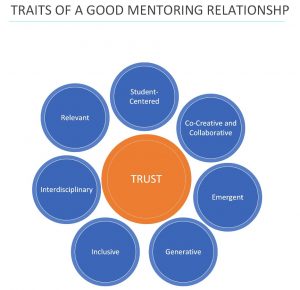6 ELEMENTS OF A SUCCESSFUL MENTORING RELATIONSHIP
As with many other relationships in your life, a successful mentoring relationship is one that requires the parties involved to be committed to the work that needs to be done. In this case, that would be helping you navigate and negotiate school for you to successfully graduate. A mentoring relationship is characterized by several traits that can be helpful in determining what you need in such a relationship.
- Reciprocity
- What will you and your mentor give-receive?
- Learning
- What will you or have you learned, what do you want to learn from/with your mentor?
- Relationship
- What type of relationship would you like to have with your mentor, and what expectations do you have about this relationship? What does it mean to be in a relationship with someone?
- Partnership
- How will the mentor share responsibility and investment with you to develop and maintain the relationship?
- Collaboration
- How do you and your mentor share knowledge that will help you move forward in your professional and personal goals?
- Mutually Defined Goals
- How will you and your mentor agree upon clearly defined goals and outcomes?
- Development
- How will you and your mentor determine your progress and development on your goals?
- Context
- How do your cultural, historical, social, socio-economic, and/or other contexts shape your expectations of your mentor, mentoring, and your academic experiences?
- How will your mentor learn about these?
(adapted from The Mentor’s Guide: Facilitating Effective Learning Relationships by Lois J. Zachary)
The GMC has identified other traits of a good mentoring relationship:

- Trust
- Is this someone with whom you can share your concerns?
- Is this someone with whom you can share your work without fear or reservation?
- Student-Centered
- Are the student’s needs prioritized?
- Does mentor help student develop an individualized education or semester plan?
- Does the relationship acknowledge dynamics of power between faculty and students?
- Co-Creative and Collaborative
- Is the mentoring relationship nonhierarchial?
- Does it offer opportunities for research collaboration?
- Does the mentor use their power and authority to assist the student?
- Emergent
- Does the relationship leave room for different outcomes and patterns of learning to be created?
- Does the mentor assist the mentee in responding to unexpected events and patterns so that they benefit instead of hindering them?
- Generative
- Do formal and informal meetings lead to additional ideas?
- Can the relationship grow with the student’s growing needs and interests?
- Inclusive
- Does the relationship welcome all aspects of the student’s life?
- Does it consider the larger contexts that shape the student’s studies and research?
- Interdisciplinary
- Does the relationship encourage exploration and/or community outside the student’s discipline?
- Relevant
- Is the relationship relevant to the student’s professional interest and growth?
We cannot emphasize enough the importance of trust in the mentoring relationship, especially as it pertains to confidentiality between the mentor and mentee. Please note that confidentiality is complex and mentors and mentees are encouraged to discuss their definitions and needs for confidentiality when sharing information not once, but at each instance when necessary. Discussing the following questions could be helpful when sharing sensitive information: What makes the information shared confidential? What are university rules about confidentiality about particular forms of information (e.g., mental health or safety)? What records or documentation do you need to maintain? How will you safeguard the information shared? What if and when do you need to ask for consent to share information?
When all of the traits and considerations are intentionally practiced and embodied, both mentor and mentee are transformed, and how they understand mentoring, research, teaching, and being part of a community of scholars is also transformed and, hopefully, shared with others.

